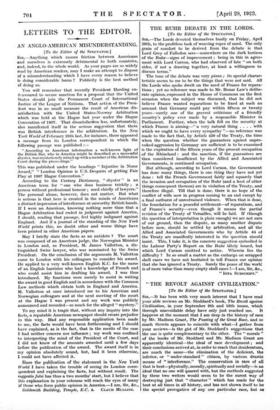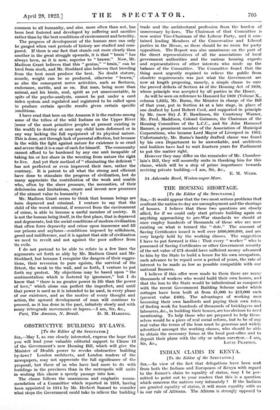" THE REVOLT AGAINST CIVILIZATION,"
[To the Editor of the SPECTATOR.]
SIR,—It has been with very much interest that I have read your able reviews on Mr. Stoddard's book, The Revolt against Civilization, in your September 9th and 16th issues, which through unavoidable delay have only just reached me. It happens at the moment that I am deep in the history of race by Mr. Madison Grant, The Passing of the Great Race, and so much therein appears to coincide with what—I gather from your reviews—is the gist of Mr. Stoddard's suggestions that the one is quite complementary to the other. The " morals " of the books of Mr. Stoddard and Mr. Madison Grant are apparently identical—the ideal of race development ; and their conclusions arrived at, in order to reach that desideratum, are much the same—the elimination of the deficient, the inferior, or " under-standard " citizen, by various. drastic means of " interference." The conservation in race of all that is best—physically, morally, spiritually and socially—is an ideal that no one will quarrel with, but the methods suggested by these two writers would seem to be the surest way of destroying just that " character " which has made for the best at all times in all history, and has not shown itself to be the special prerogative of any one particular race, but as
common to all humanity, and also, more often than not, has been best fostered and developed by suffering and sacrifice rather than by the best conditions of environment and heredity.
The progress of development of the human race can only be gauged when vast periods of history are studied and com-
pared. If there is one fact that stands out more clearly than another in the great struggle upwards, it is that " brain " has always been, as it is now, superior to " brawn." Now, Mr. Madison. Grant believes that this " genius," " brain," can be bred from stock, and Mr. Stoddard also believes that breeding from the best must produce the best. No doubt stature, muscle, weight can be so produced, otherwise " brawn," as also the consequent nerve activities, such as fleetness, endurance, mettle, and so on. But man, being more than animal, and his brain, soul, spirit as yet unaccountable, in spite of the psycho-analysts, cannot be put under a card index system and regulated and registered to be called upon to produce certain specific results given certain specific conditions.
I have read that here on the Amazon it is the custom among some of the tribes of the wild Indians on the Upper River (some of the most primitive peoples at present existing in the world) to destroy at once any child born deformed or in any way lacking the full equipment of its physical nature. This is done, not through lack of parental affection, but because in the wilds the fight against nature for existence is so cruel and severe that it is a case of each for himself The community cannot afford to be burdened by any one unit incapable of taking his or her share in the wresting from nature the right to live. And yet their method of " eliminating the deficient " has not perfected or even improved their race, rather the contrary. It is patent to all what the strong and efficient have done to stimulate the progress of civilization, but do many appreciate the contribution of the weak and unable who, often by the sheer pressure, the necessities, of their deficiencies and limitations, create and invent new processes of the utmost value to humanity ?
Mr. Madison Grant seems to think that human beings are born depraved and criminal. I venture to say that the child of the worst criminal, if removed from the environment of crime, is able to become a useful member of society. It is not the human being itself, in the first place, that is depraved and degenerate, but the social conditions of modern civilization that often force depravity and crime upon innocence and fill our prisons and asylums—conditions imposed by selfishness, greed and indifference, and it is against that side of civilization we need to revolt and not against the poor sufferer from its evils.
I do not pretend to be able to refute in a few lines the arguments set forth so ably by Mr. Madison Grant and Mr- Stoddard, but because I recognize the dangers of their sugges- tions, their reversion to pure egoism, the survival of the fittest, the weak to the wall, and so forth, I venture to put forth my protest. My objections may be based upon " the sentimentalism which is fostered by ignorance," but I do know that " there is no greater power in life than the power of love," which alone can perfect the imperfect, and until that power is used as it is intended to be used, in every phase of our existence, and as the motive of every thought and action, the upward development of man will continue to proceed, as it has done in the past, infinitely slowly and with many retrograde movements or lapses.—I am, Sir, &c., Para, The Amazon, N. Brazil. D. M. HARDING.



















































 Previous page
Previous page